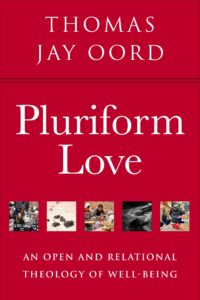“Another Love Book?”
I recently gave a lecture in Vancouver, BC at an event co-hosted by Vancouver School of Theology and St. Andrews Wesley United Church. In my lecture, I explored seven obstacles to love and how we might overcome them. My book, Pluriform Love, provided the details for my arguments.
Of the 25+ books I’ve written or edited since graduate school, most have “love” in their title or subtitle. With each publication, my wife teases me, “Another love book? Haven’t you said all you can say?”
I shrug and reply, “Apparently not.”
To me, pondering love is like pondering God: my interest never tires. Words never capture love or God fully, but I hope to make progress. I want “to grasp how wide and long and high and deep is the love of Christ and to know this love that surpasses knowledge” (Eph. 3:18b-19a).
A winsome vision of a loving God is central and motivates me to love God, others, myself, and all creation.
Love is Pluriform
To say love is “pluriform,” as my book’s title does, is to say love has multiple dimensions and expressions. Love cannot be understood well nor experienced fully if confined to only one or a few forms. A holistic account of love includes, but goes beyond, the typical categories of sacrifice, sex, desire, friendship, generosity, compassion, and more.
Pluriform love points to this diversity.
Not only do creatures express pluriform love, but God does too. Divine love is not just sacrificial. Nor is love simply desire for what’s valuable; it’s not just communal relationship, and it’s not primarily aimed at God’s own glory. To put it positively, divine love is compassionate, involves forgiveness, repays evil with good, delights in beauty, rejoices in the good, and enjoys a good joke.
God’s love is pluriform.
Love in Conventional Theology
Most theologians have said God’s love is altogether different from ours. In other words, divine love is an exception to the fundamental principles of love that apply to all.
I disagree. I believe the basic meaning of love – although having multifarious expressions – applies to both creatures and Creator. A good definition of love should apply uniformly to God and others, although love’s expressions are pluriform.
Conventional theologies cannot account well for love. Ours or God’s.
Some theologians embrace agape, for instance, but reject eros and philia. In those theologies, God gives but can’t respond to, delight in, or befriend us. Others think of love as desire rather than acting to promote well-being. In some theologies, God only loves Godself.
I criticize theologians and biblical scholars who fail to follow the logic of love. I also criticize philosophical assumptions and biblical interpretations that undermine love’s supremacy.
Our Biggest Questions
When understood well, love illuminates. It answers our biggest questions about God and life.
Perhaps the biggest questions for theists and atheists alike revolve around evil. If a loving and powerful God exists, why doesn’t this deity prevent unnecessary suffering, pointless pain, and genuine evils? I’ve answered that question in previous books, including The Uncontrolling Love of God and God Can’t. I point to what I call “essential kenosis” as crucial to solving the problem of evil.
If the Apostle John is correct that God is love, we need to ask about God’s nature. Can God choose not to love? I’ll answer this by claiming God is essentially loving. The divine essence-experience binate means God unchangingly loves but changingly experiences and expresses love moment by moment.
If God always loves creatures, we might wonder if there ever was a time God did not relate to creation. In Pluriform Love, I argue that God’s steadfast love literally endures forever. I call this “essential hesed.” In covenant with them, God everlastingly relates with and loves creatures and creation.
We Need Love
This book argues that for life to flourish, we need the light of love. We need it to blaze in all directions, not just one or a few. We should celebrate the diversity of love both God and creatures can express.
Creatures can imitate the Creator whose love is pluriform.



Comments